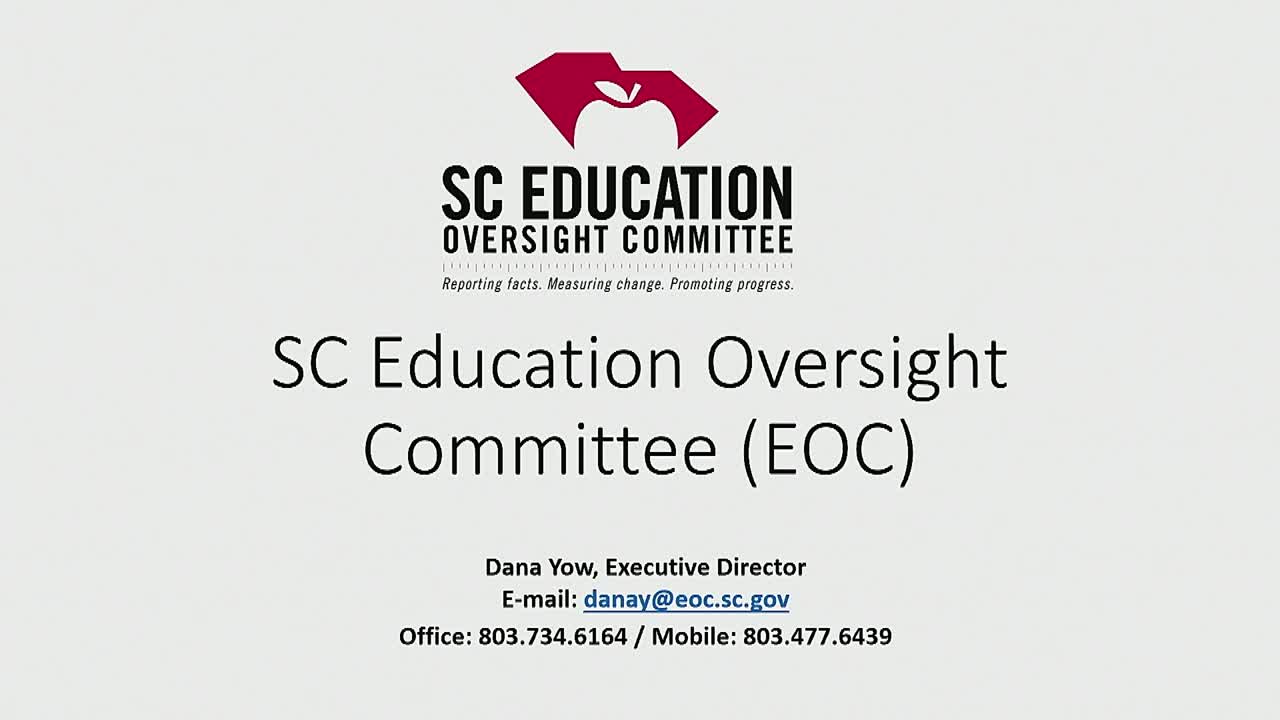State education officials outline reading, math and attendance pushes, warn of large third-grade retention pool
Get AI-powered insights, summaries, and transcripts
Subscribe
Summary
House Education committee heard briefings from the Education Oversight Committee and the State Department of Education on the EOC dashboard, science-of-reading training, Palmetto Math Project, chronic absenteeism and a Read to Succeed retention threshold that could affect more than 16,000 third graders.
The House Education and Public Works Committee on Thursday heard state education leaders describe ongoing efforts to raise literacy and numeracy, address chronic absenteeism and prepare for a first-year surge of third-grade retention under the Read to Succeed law.
"I'm Dana Yao, I'm the executive director of the Education Oversight Committee," Yao said as she opened a presentation on the EOC's role, data dashboard and program evaluations. The EOC reported that the on-time graduation rate for the class of 2024 was 85.4 percent.
The committee also heard from Philip Cease, director of governmental affairs for the South Carolina Department of Education, who reviewed the department's strategic plan and budget requests and said the agency aims to expand the Palmetto Math Project and finish statewide rollout of science-of-reading training. "The mission of the South Carolina Department of Education is to serve students, support teachers, empower parents, engage the community so that every student graduates prepared to reach their full potential," Cease told committee members.
Why it matters: Lawmakers face competing pressures — raising proficiency while avoiding large-scale disruptions to students and districts. Committee members repeatedly asked how to square an improving graduation rate with lower proficiency and how to handle retention and summer interventions required by Read to Succeed.
Key facts and proposals
- Graduation and readiness: The EOC showed an 85.4 percent on-time graduation rate for the 2024 class and presented measures it uses for college and career readiness. During Q&A, members noted confusion about how many graduates meet college- and career-ready measures; committee members asked staff to clarify those comparisons.
- Read to Succeed retention: Cease told the committee that, under current Read to Succeed standards, 16,238 third graders "would have been eligible for retention" last year. He said summer reading camps and other supports are part of the strategy to reduce that number before final retention decisions are made.
- Science of Reading and LETRS: Cease and other speakers described a large, state-supported push to train K–3 teachers in LETRS-based science-of-reading methods; the department said nearly 20,000 teachers are "either in the pipeline or have completed" the training and that a stipend is available upon completion.
- Palmetto Math Project: After a pilot year, the Palmetto Math Project is being expanded with a request to fund high-quality instructional materials for math; Cease said a separate budget hearing was scheduled to consider funding for math materials.
- Attendance and chronic absenteeism: Dana Yao flagged chronic absenteeism as a growing concern. She told members the EOC's dashboard and recent focus groups show absenteeism is affecting achievement; the EOC has completed student and parent focus groups and said full results would be shared with the committee when ready.
- Rural teacher recruitment: The EOC reviewed evaluations of a rural recruitment incentive program, noting the state is investing $7.6 million of Education Improvement Act funds in a menu of incentives — housing supports, mentoring and recruitment fairs — and that the EOC has been studying return on investment for those incentives.
- Data tools and transparency: Both the EOC and the department urged members to use dashboardsc.sc.gov, a public dashboard that allows drill-down by school and graduating class for outcomes including postsecondary enrollment and persistence.
Discussion, reactions and next steps
Committee members pressed staff on the relationship between on-time graduation and actual proficiency in reading and math. Representative Bradley asked whether districts are relying on retention or other interventions and requested meetings with EOC and department leaders to discuss remediation strategies. Representative Tipple and others asked for numbers on rural teacher turnover and for details from the EOC evaluation of recruitment incentives.
Cease and Yao described the department's budget priorities: increases to starting teacher pay (a proposed request to raise starting salaries to $50,000), funding for high-quality instructional materials, summer reading camps and expanded supports for school administrators. Cease emphasized summer reading camp funding and the statewide rollout of LETRS as steps to reduce the pool of third graders eligible for retention.
What the committee did and did not decide
This meeting served as informational briefings; no formal committee votes were taken. The Department of Education's budget requests will be considered in upcoming hearings and by the General Assembly.
Ending note
Members were repeatedly urged to review the EOC and department dashboards and to coordinate locally on implementation details, since much of the work to increase proficiency and to manage retention falls to district and school leaders. The EOC said it can provide additional data and meet with members or districts on specific questions.
